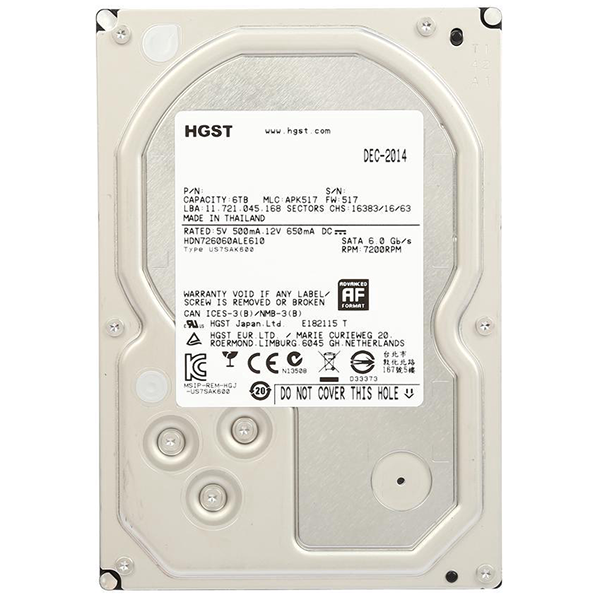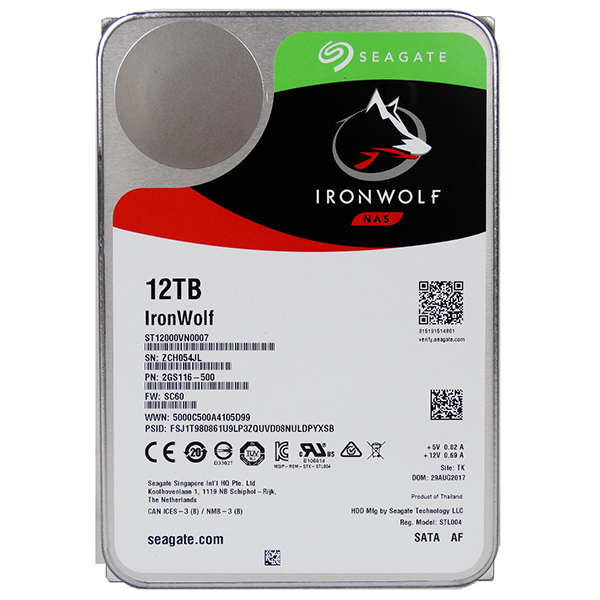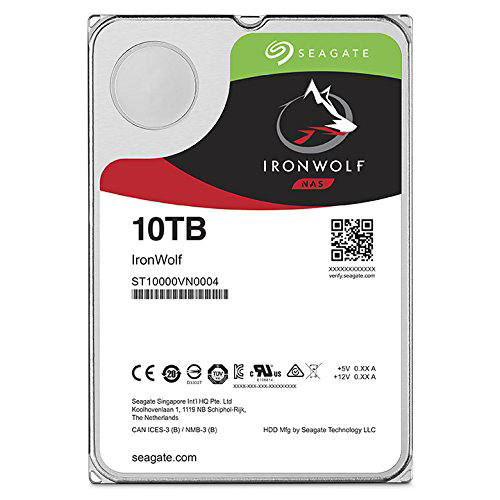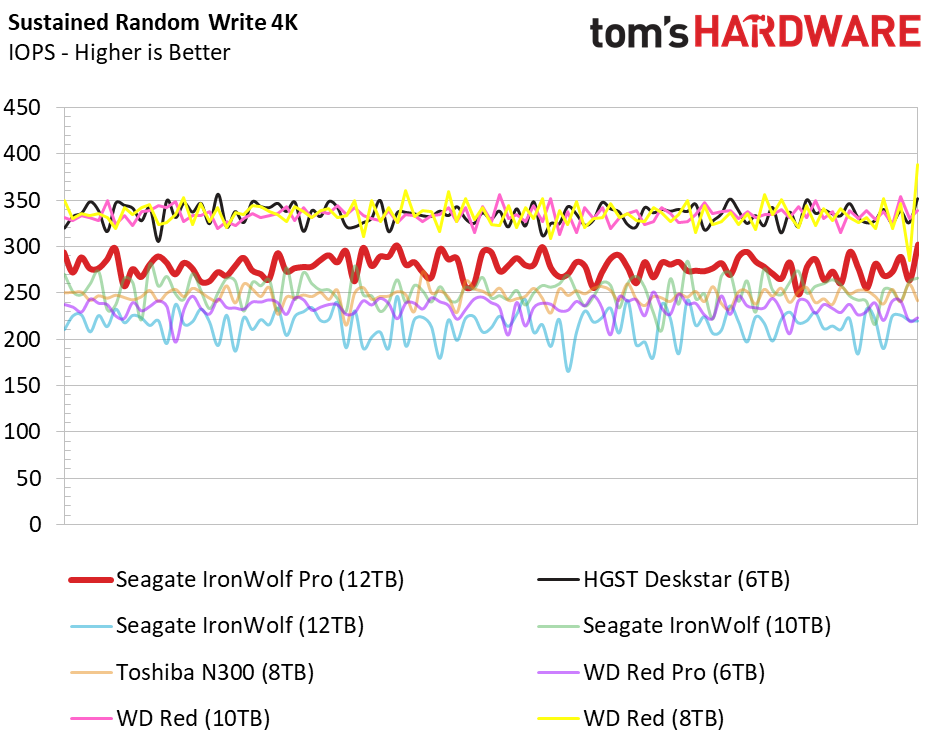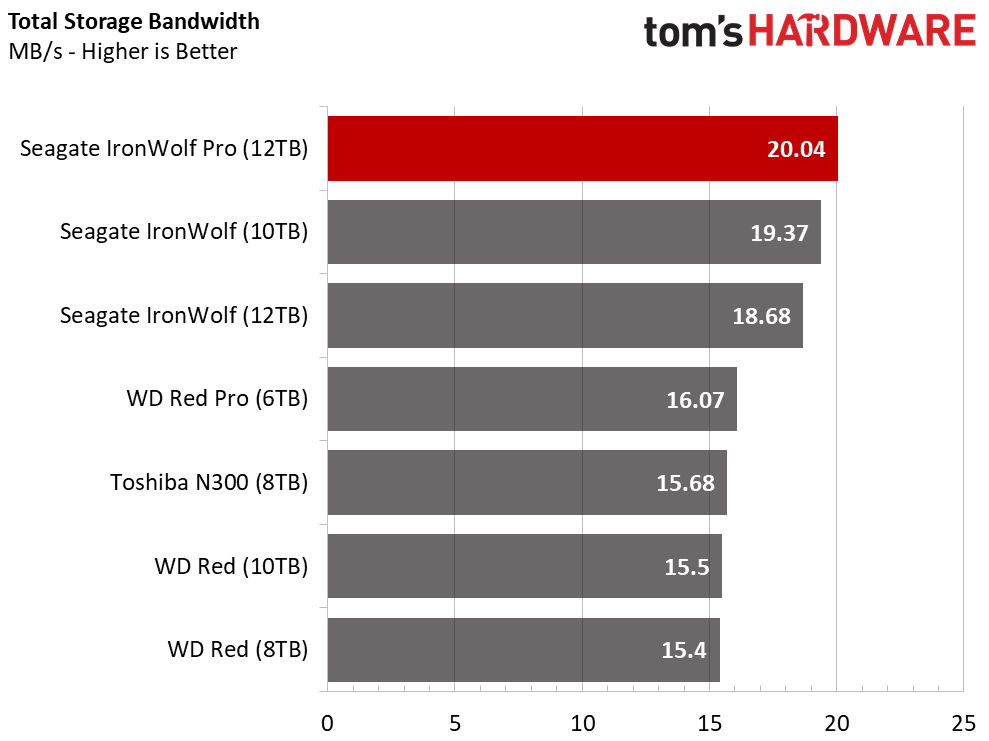Seagate IronWolf Pro 12TB Review: The Best NAS Drive?
Why you can trust Tom's Hardware
Desktop Performance Testing
Comparison Products
We divided our performance testing into two sections. On this page, we use a single drive in a desktop system to measure baseline performance. NAS-focused disk drives have become very popular in desktop systems as secondary drives. The increased vibration resistance improves the performance consistency in systems with several fans and other cooling components, like liquid pumps. Vibration will slow all hard disk drives, even those we're testing today, but the additional sensors and firmware optimizations help ensure the best performance.
All of the drives in our tests are built for NAS environments. The IronWolf Pro competes with Western Digital's Red Pro product line directly, but it also competes with the lower SKUs in the IronWolf (7,200- and 5,400-RPM) and Red (5,400-RPM) non-Pro models in smaller systems.
The rest of the drives have faster 7,200-RPM spindle speeds. The 6TB HGST Deskstar NAS and 6TB WD Red Pro are two older models, while the 8TB Toshiba N300 recently came to market.
Sequential Read Performance
To read about our storage tests in-depth, please check out How We Test HDDs And SSDs. We cover four-corner testing on page six of our How We Test guide.
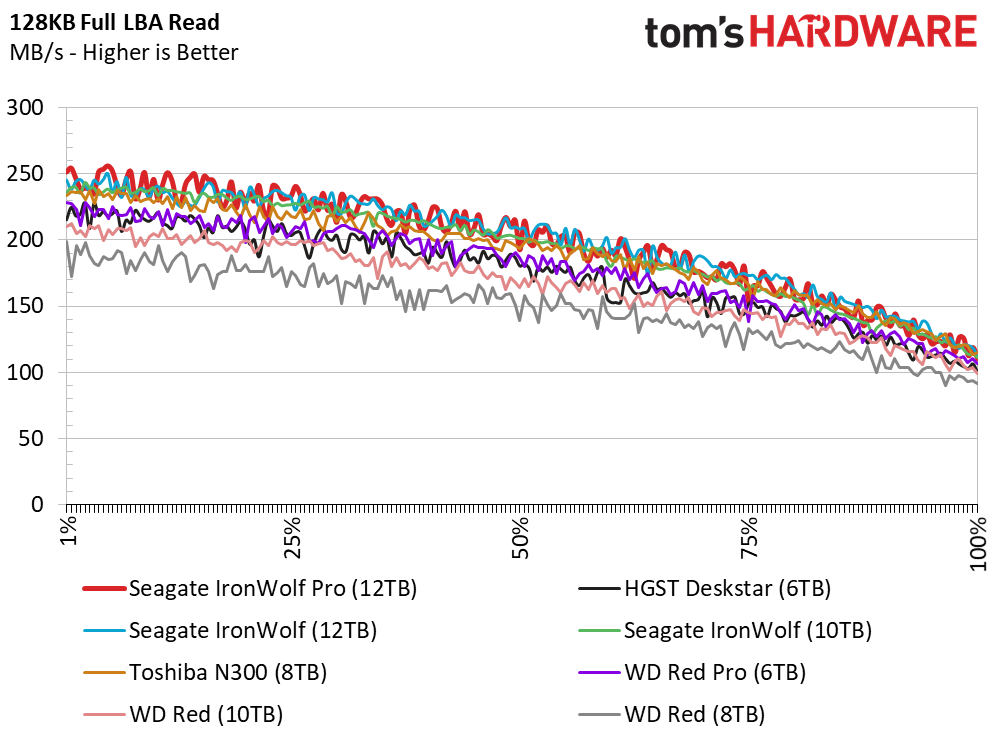
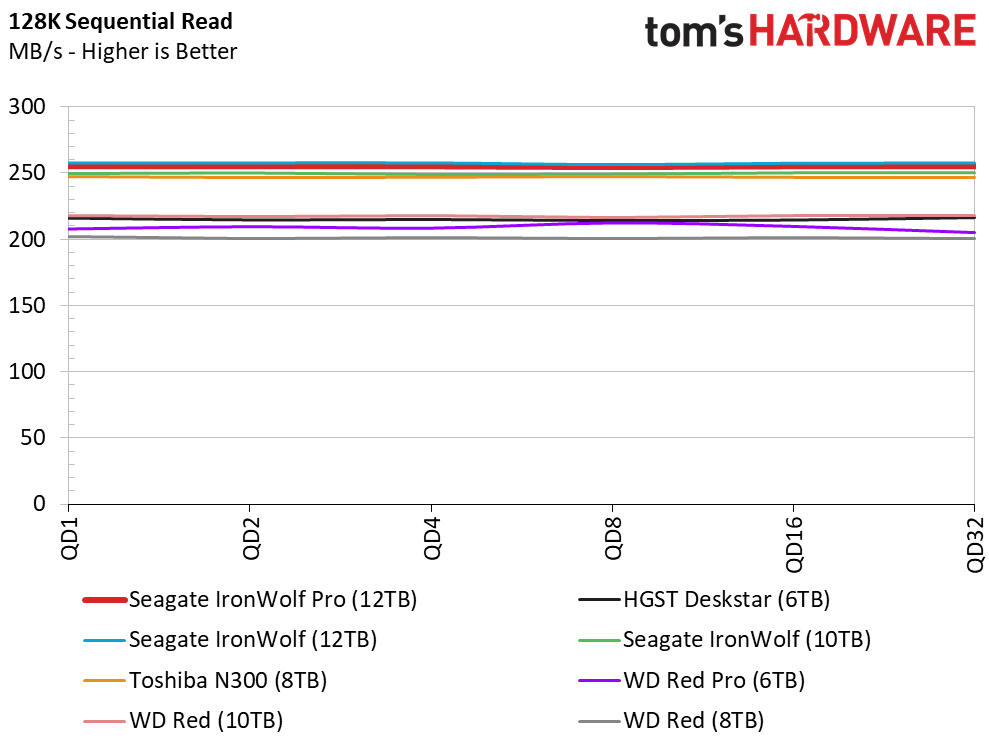
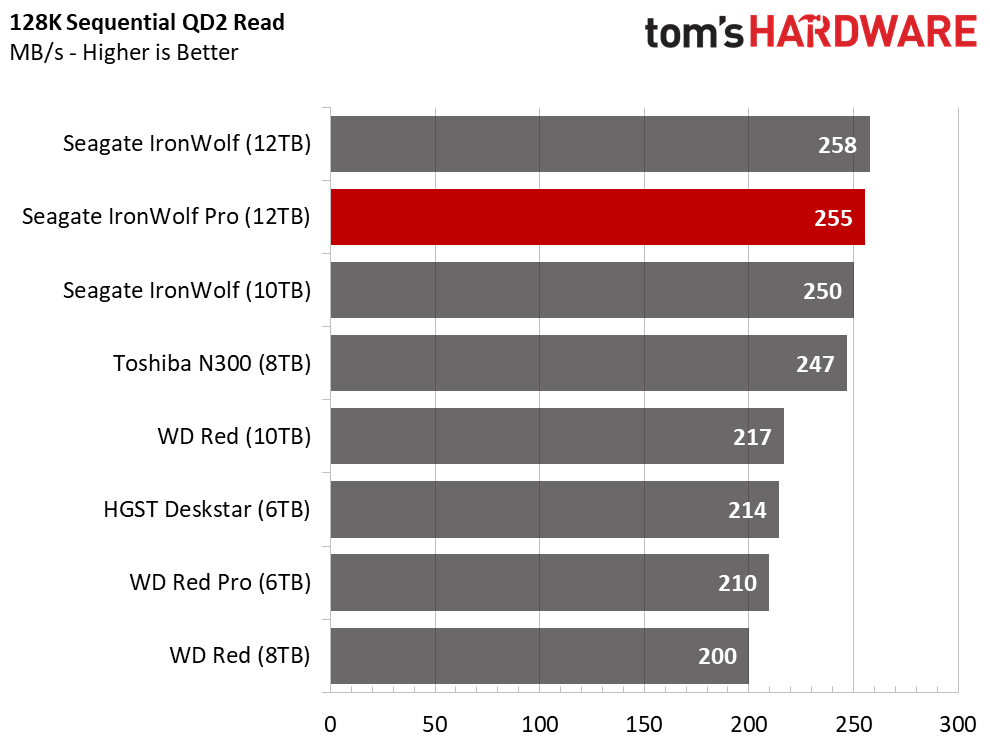
The high capacity IronWolf and IronWolf Pro will deliver similar results through most of our tests. Both drives use similar firmware, spin at 7,200-RPM, and share similar advanced features. On paper, the two 12TB IronWolf drives have a performance advantage over competing drives, and that carries over to our sequential read test. The 12TB IronWolf drives top the charts at QD2. The 10TB model follows slightly behind.
Sequential Write Performance
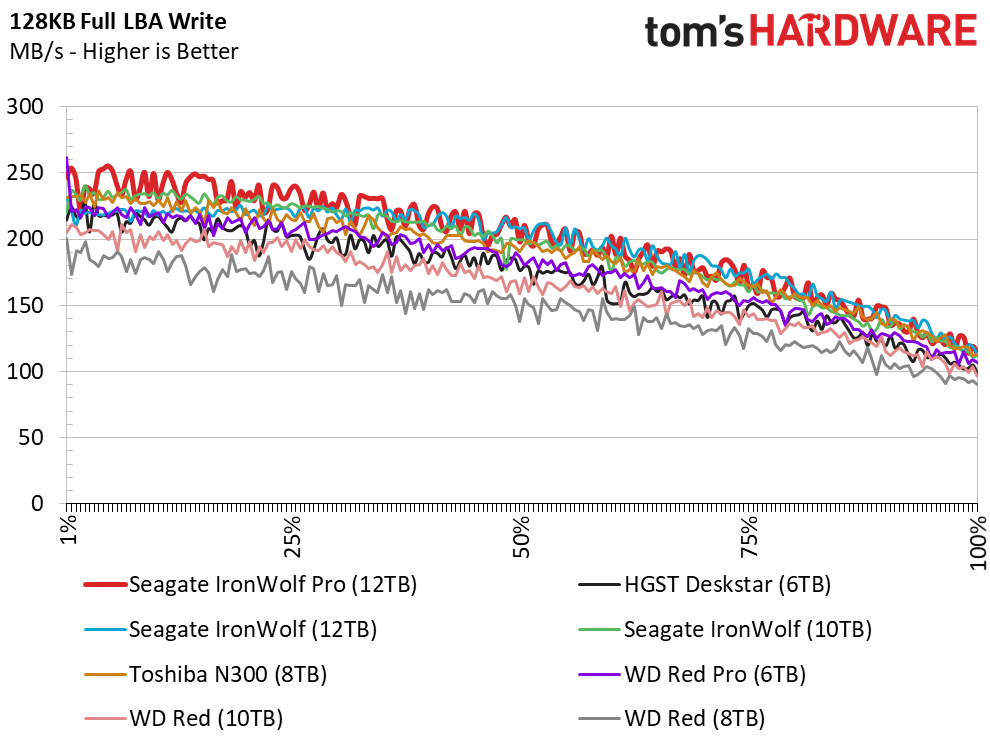
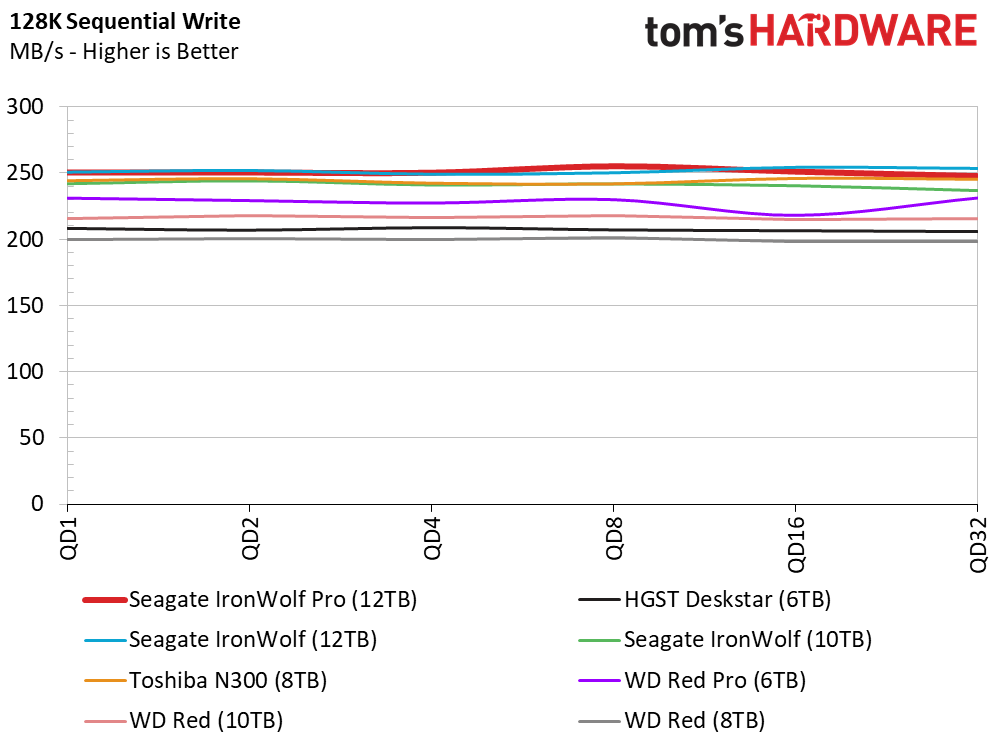
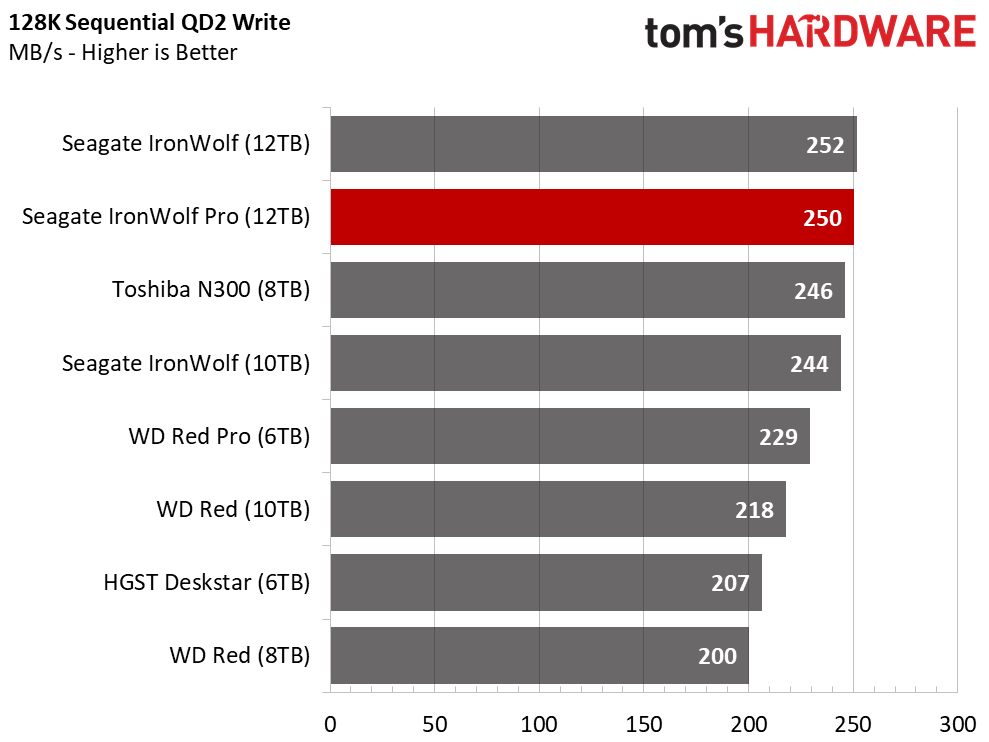
Sequential writes usually bypass the DRAM cache and the data moves directly to the platters. Some products uses the fastest portion of the platters as a cache, but we didn't observe this behavior with the IronWolf series. The 12TB IronWolf HDDs lead in the sequential write test. At QD2, both 12TB drives write at roughly 250 MB/s. The Toshiba N300 8TB trails slightly.
Random Read Performance
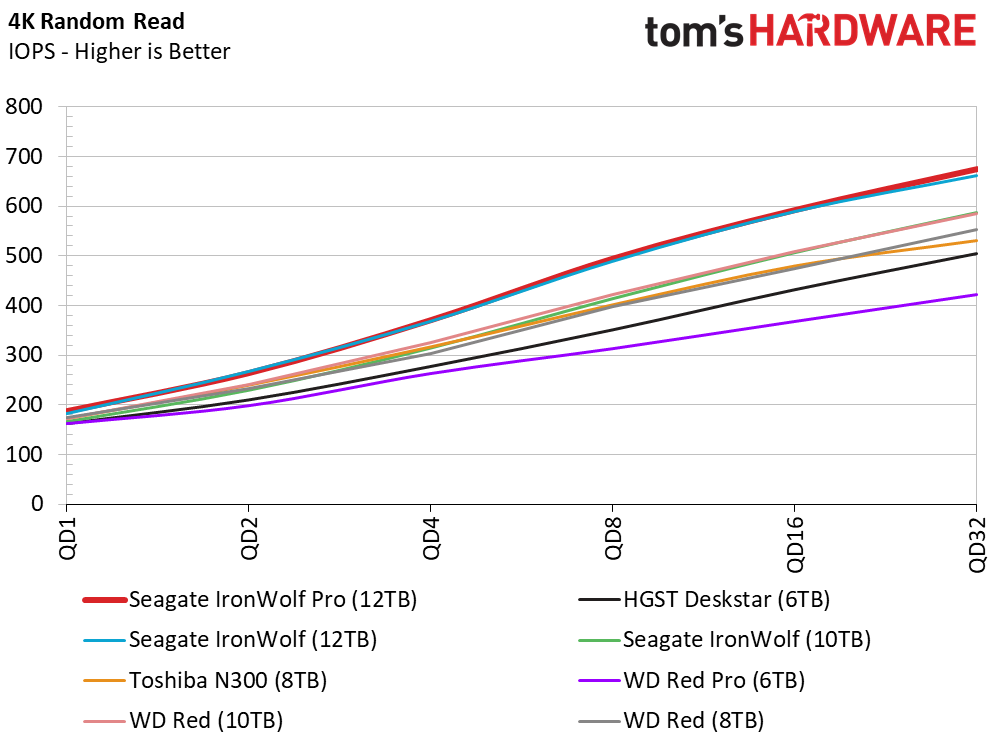
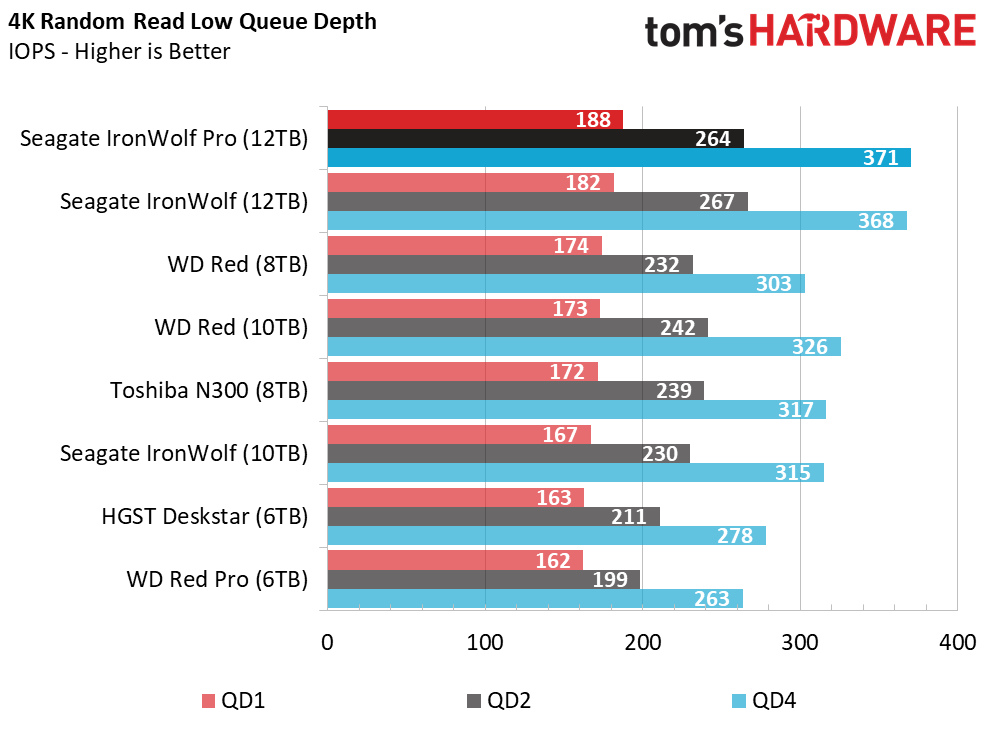
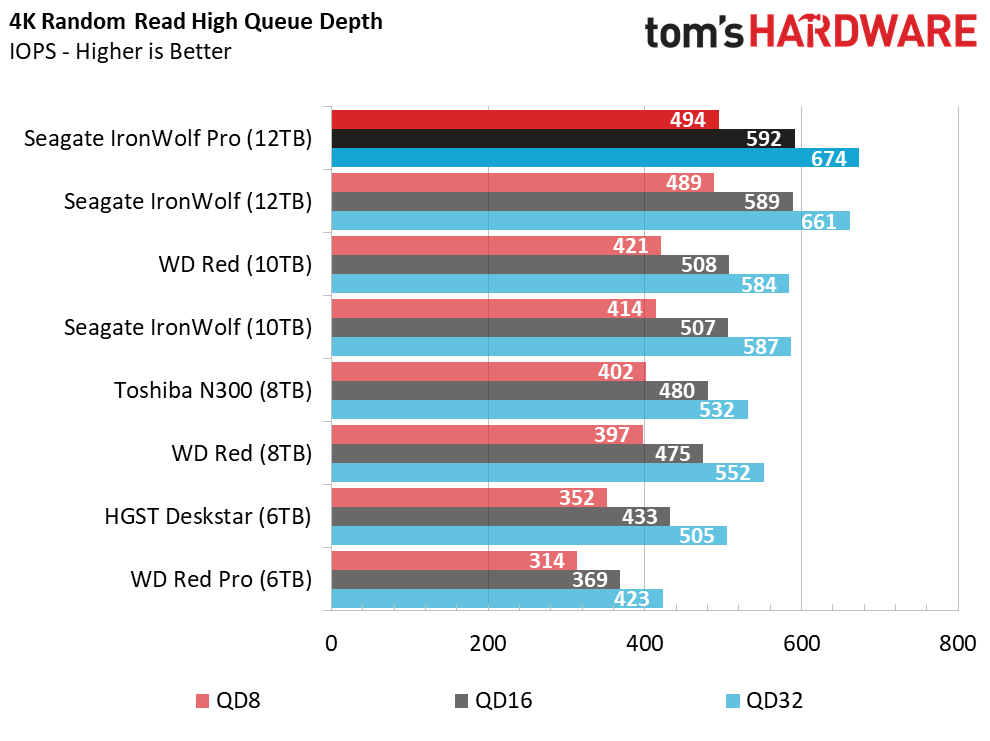
The 12TB IronWolf HDDs are in a class of their own during the random performance tests. These two drives step away from the rest of the products and the lead only increases as we intensify the workload. 4KB random performance is closely associated with Windows performance, but these drives are really for secondary storage. If you run applications on them, the IronWolf drives will feel faster than the other drives, but they aren't SSD-fast.
Get Tom's Hardware's best news and in-depth reviews, straight to your inbox.
Random Write Performance
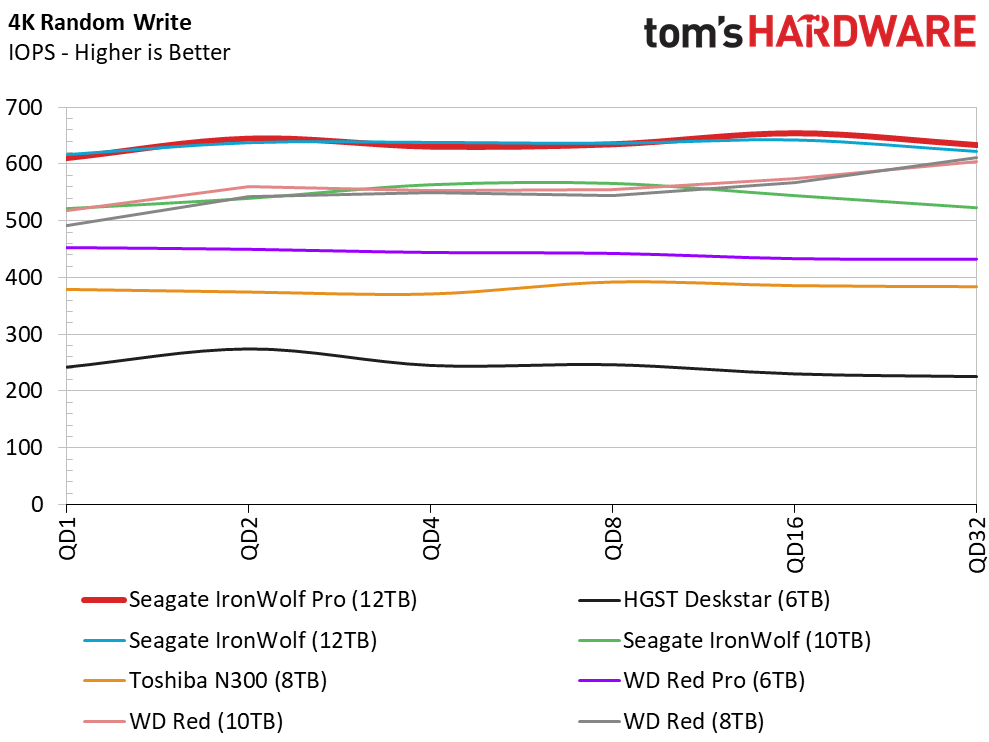
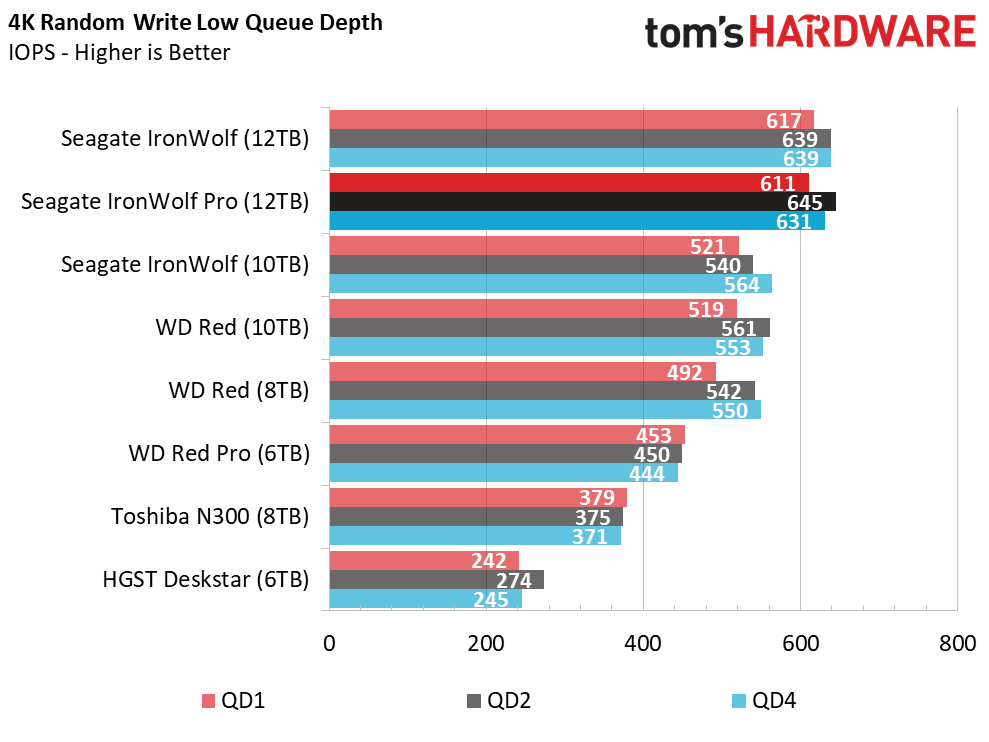
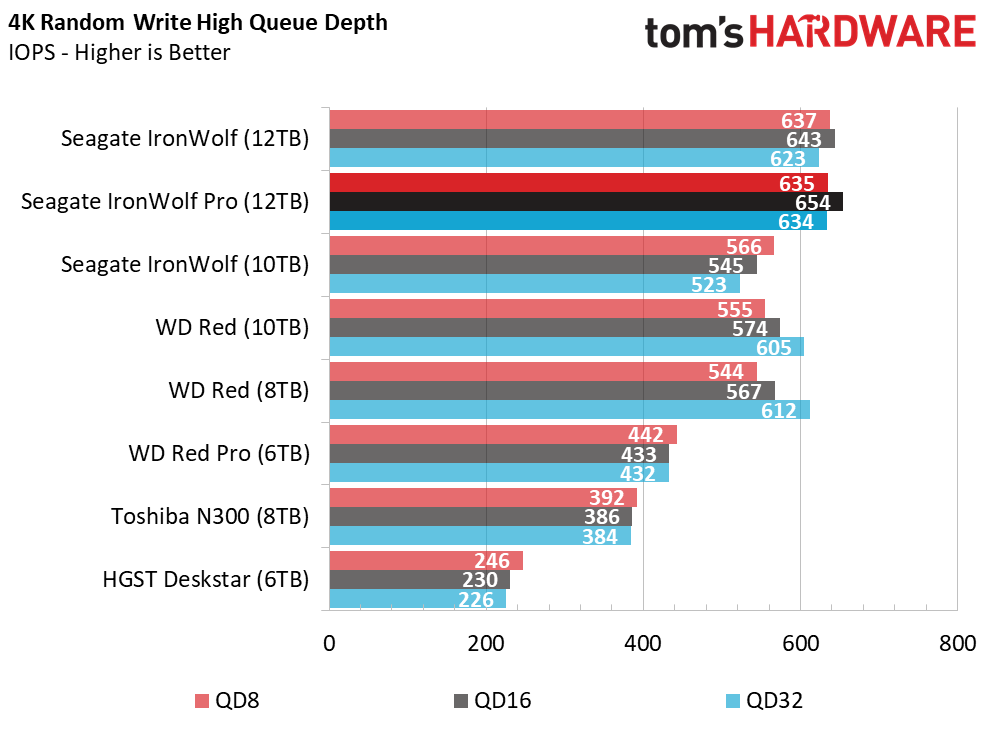
The 12TB IronWolf drives deliver nearly 100 more random write IOPS than the nearest product at QD1. The 10TB IronWolf is very close to the 10TB Western Digital Red, but then performance drops off rapidly.
80% Mixed Sequential Workload
We describe our mixed workload testing in detail here and describe our steady state tests here.
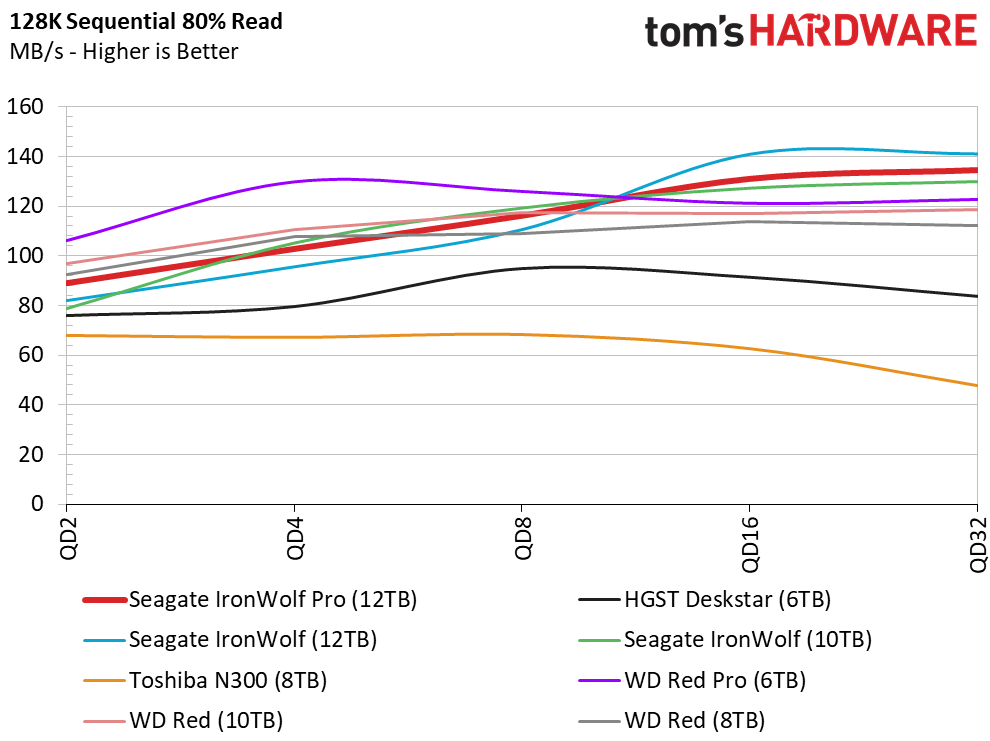
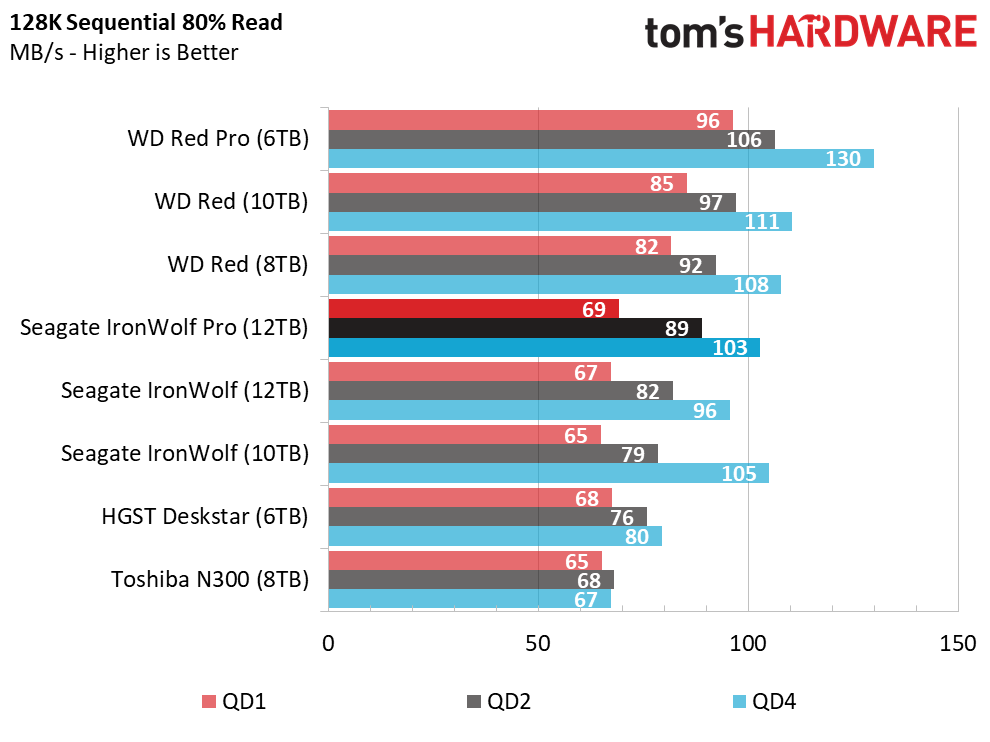
High sequential read and write performance doesn't automatically equate to the best results in the mixed workload tests. The top spot goes to the older 6TB Western Digital Red Pro. The 12TB IronWolf Pro scored nearly 30 MB/s less at QD2, and every Red outperformed every Seagate model.
80% Mixed Random Workload
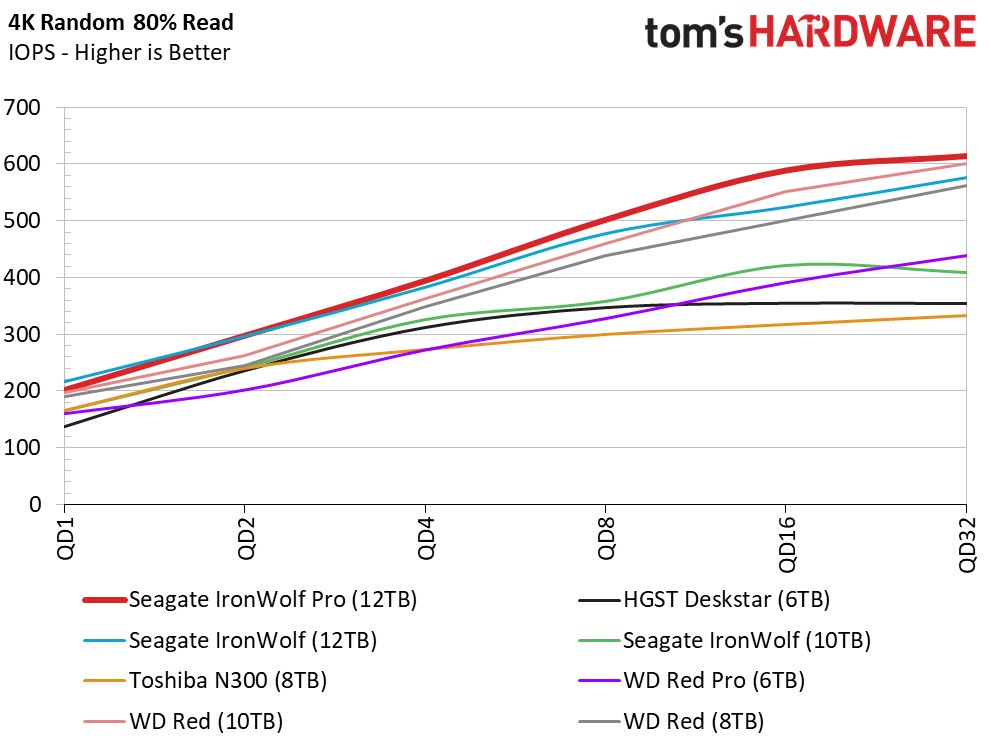
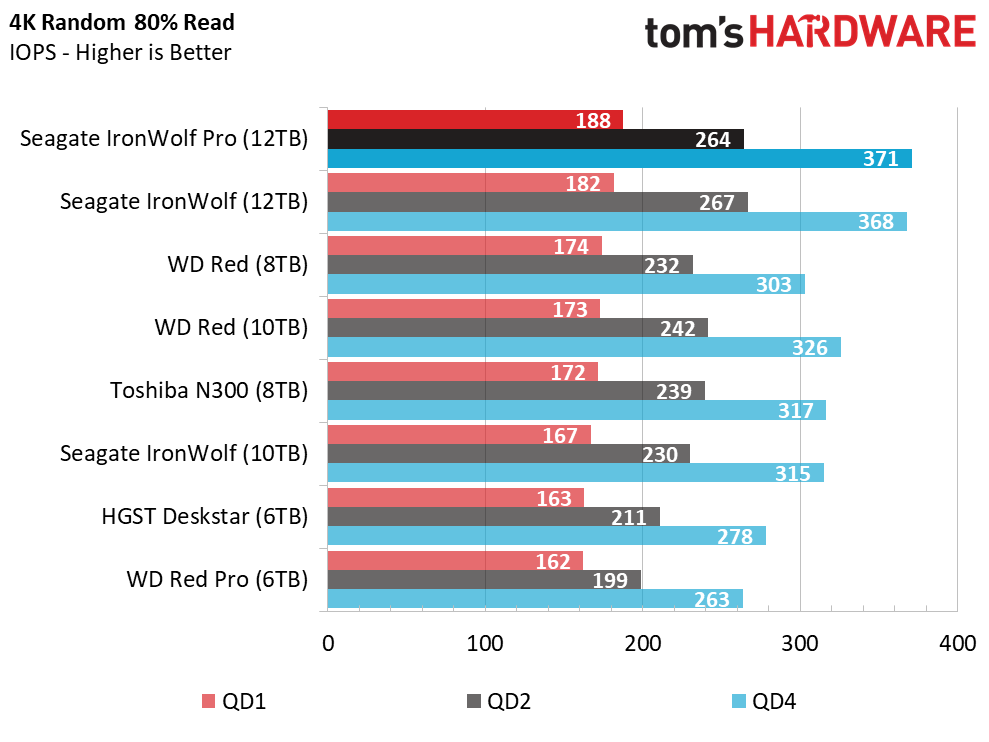
The tables turn during mixed random workloads. The two 12TB IronWolf drives retake the lead, although in a less dominant fashion. The newer Western Digital Red HDDs challenge at QD2.
Sustained Mixed Sequential Workload
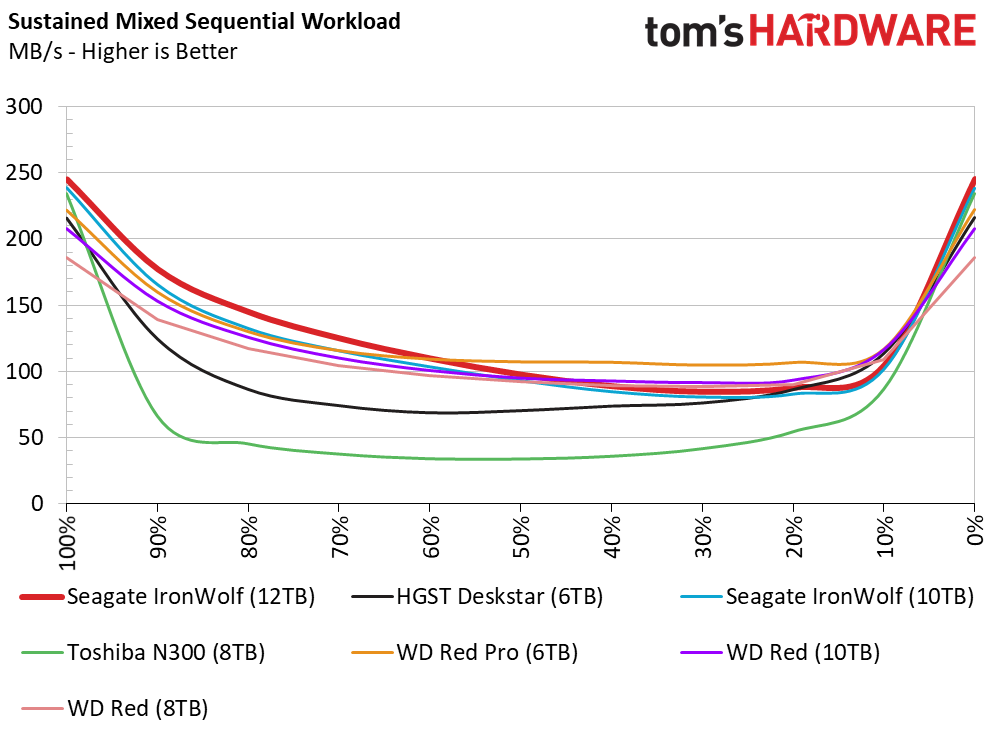
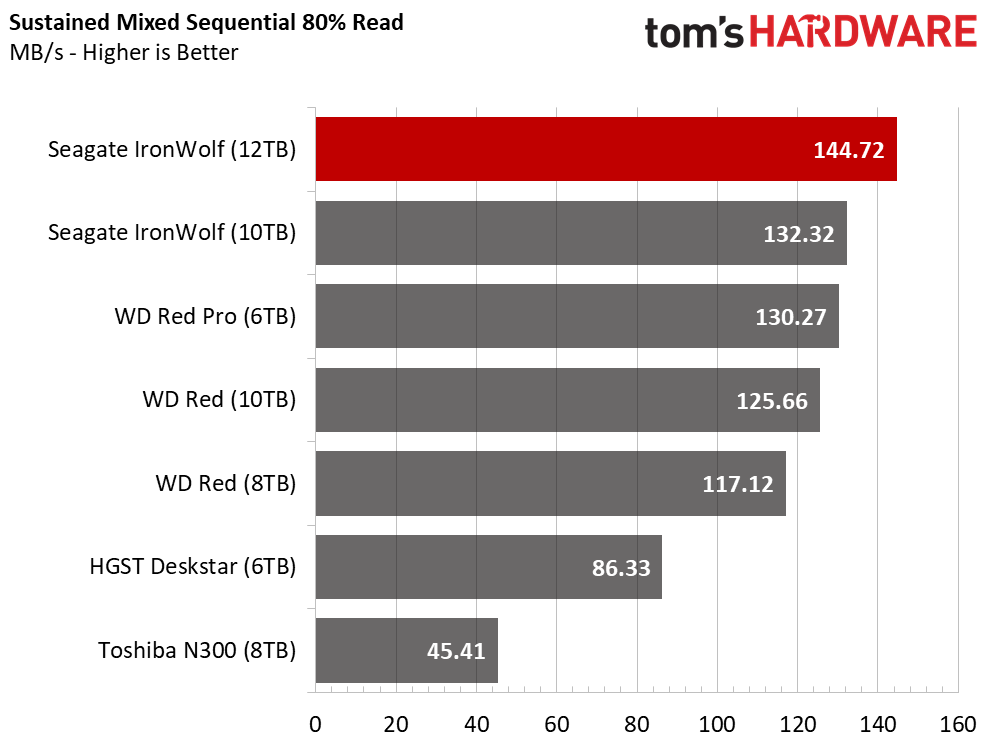
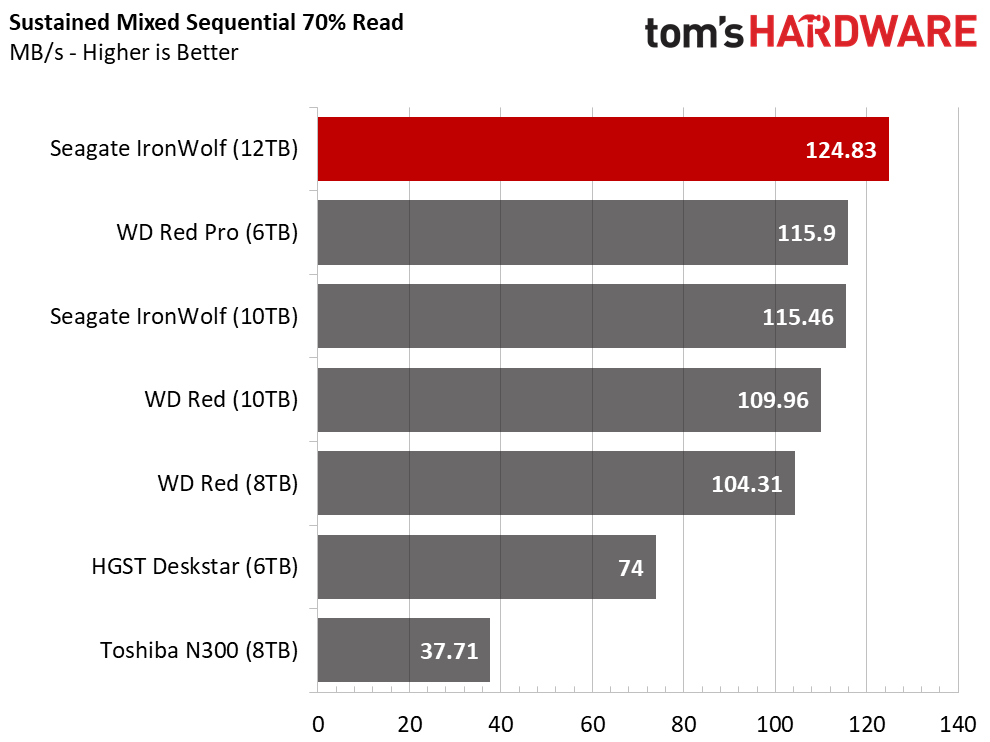
This test measures performance in eleven different sequential mixtures. The test reveals some surprising data, like the 8TB Toshiba N300 falling flat through most of the workload mixtures.
Sustained Random Workload
We run the 4KB random write test for one hour after the drives are completely full of data. Here we look at the cache performance. The 12TB IronWolf Pro has higher random write performance than the base 12TB and 10TB IronWolf drives. The HGST and Western Digital drives came out slightly faster than the Seagate HDDs.
PCMark 8 Real-World Software Performance
For details on our real-world software performance testing, please click here.
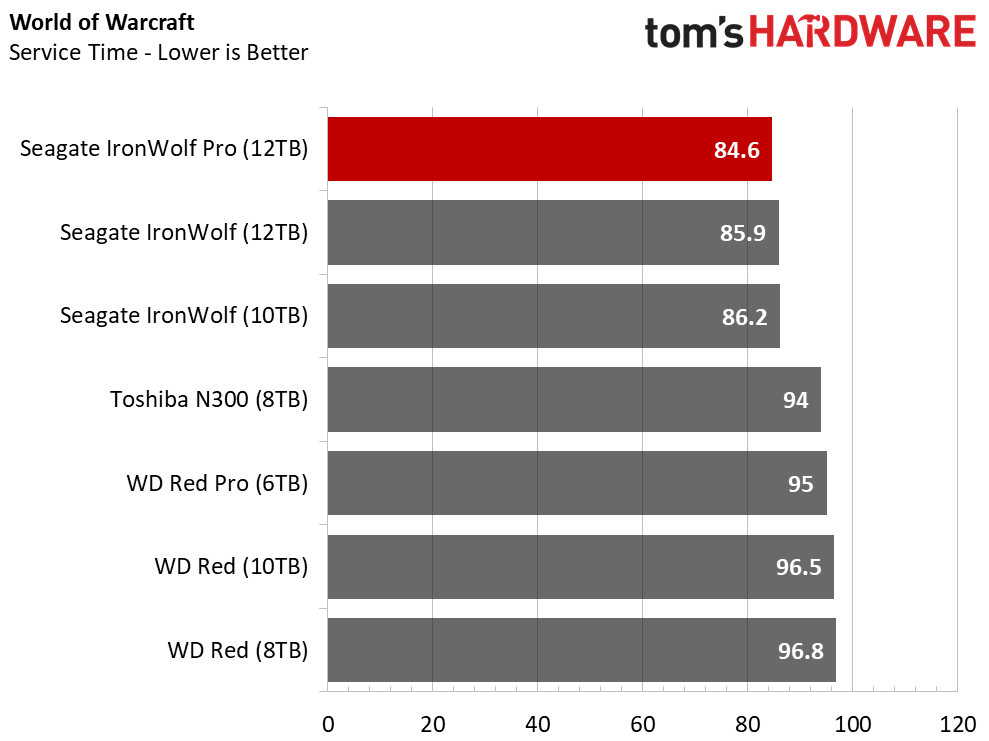
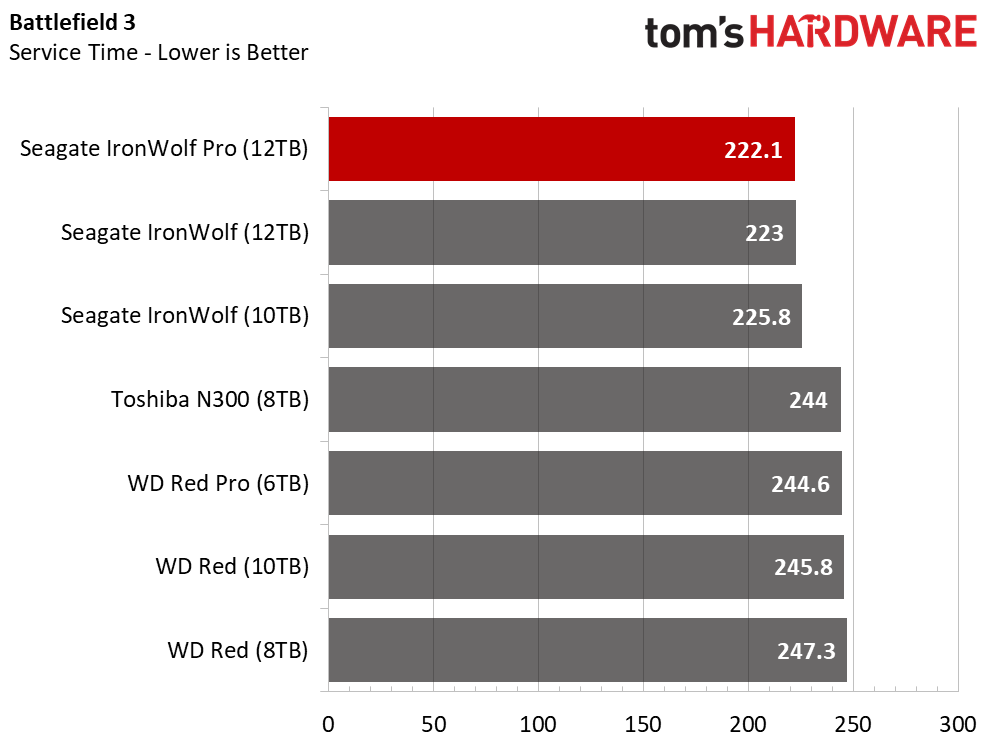
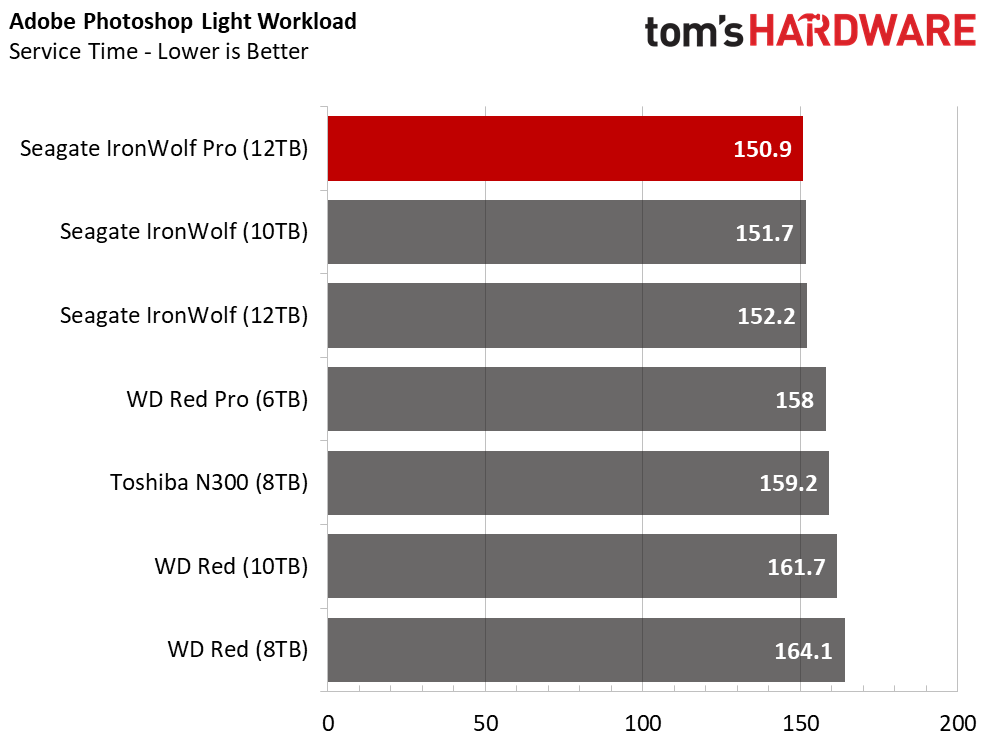
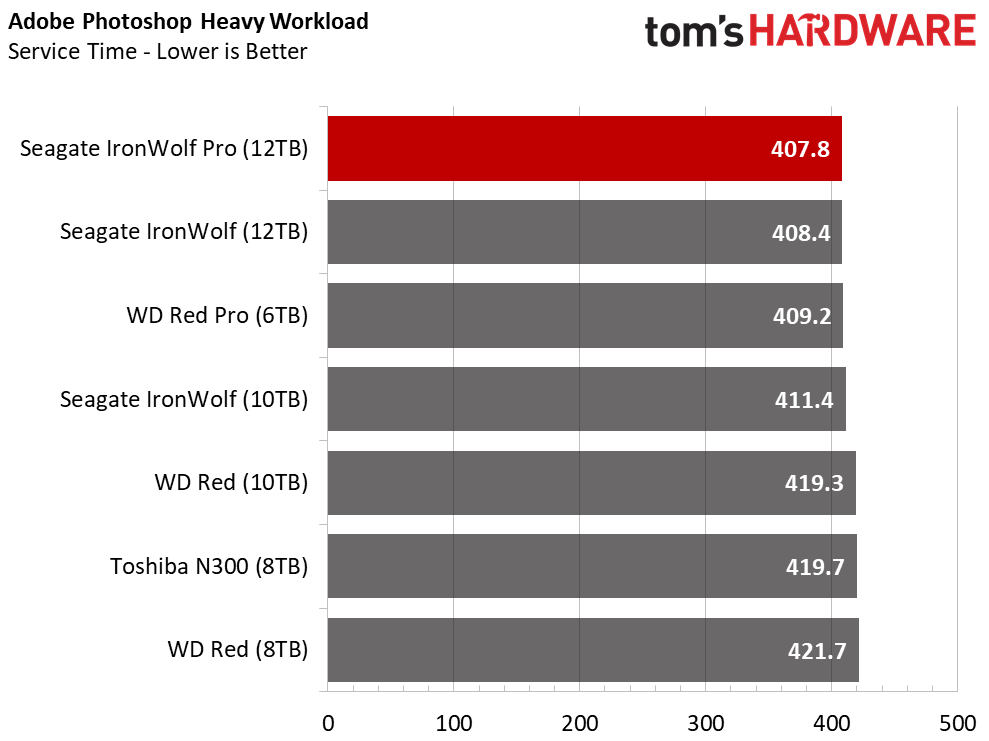
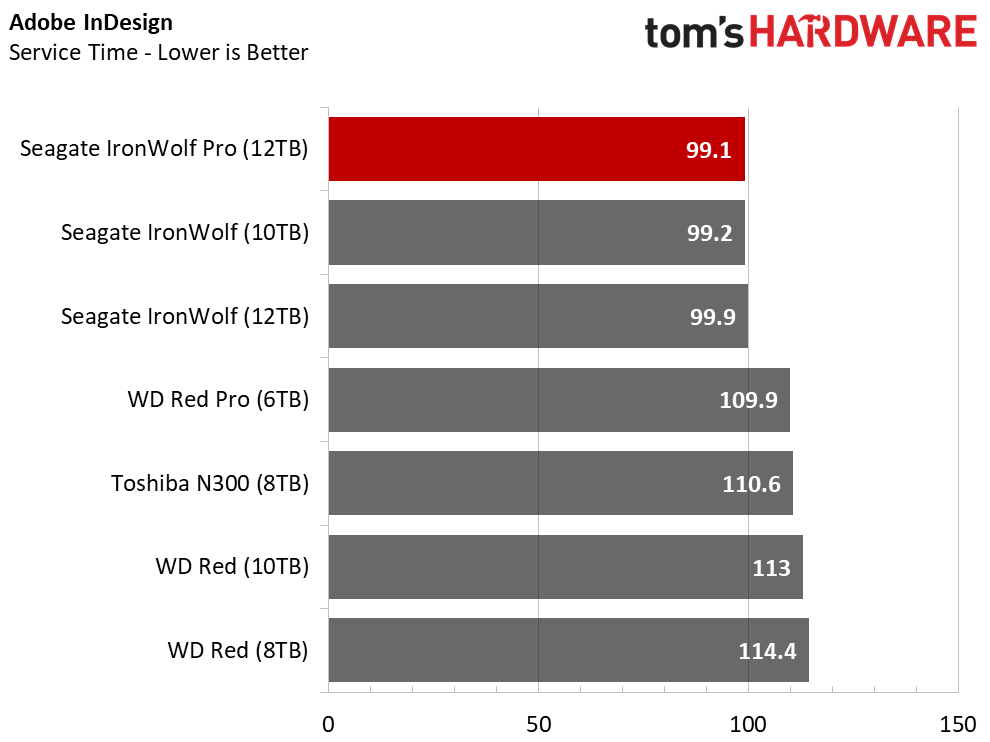
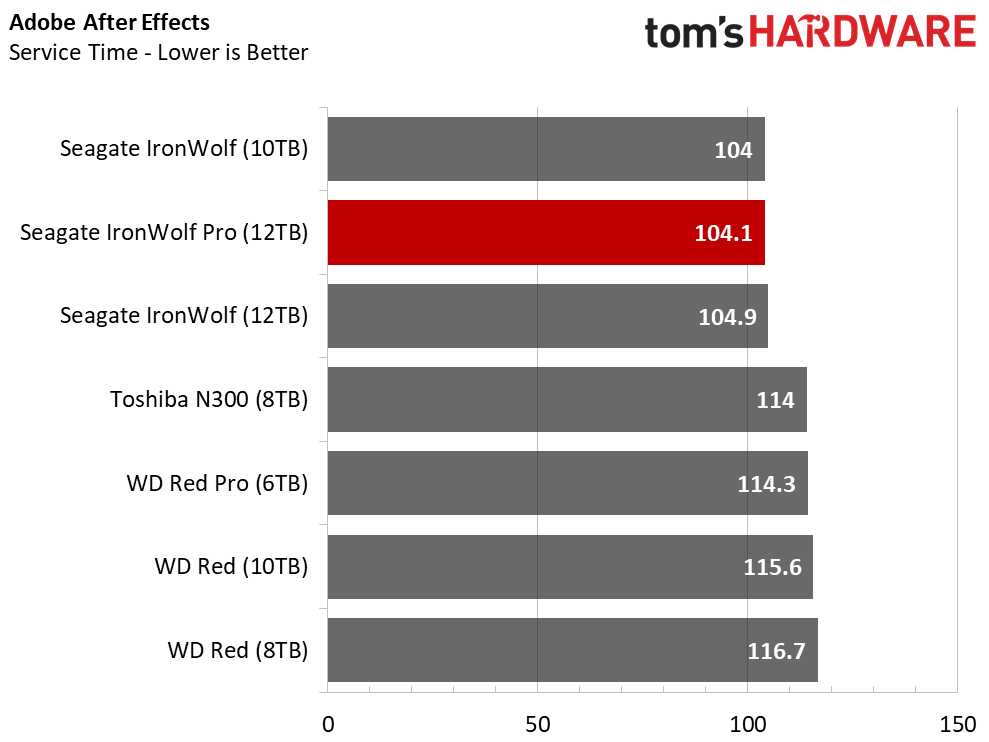
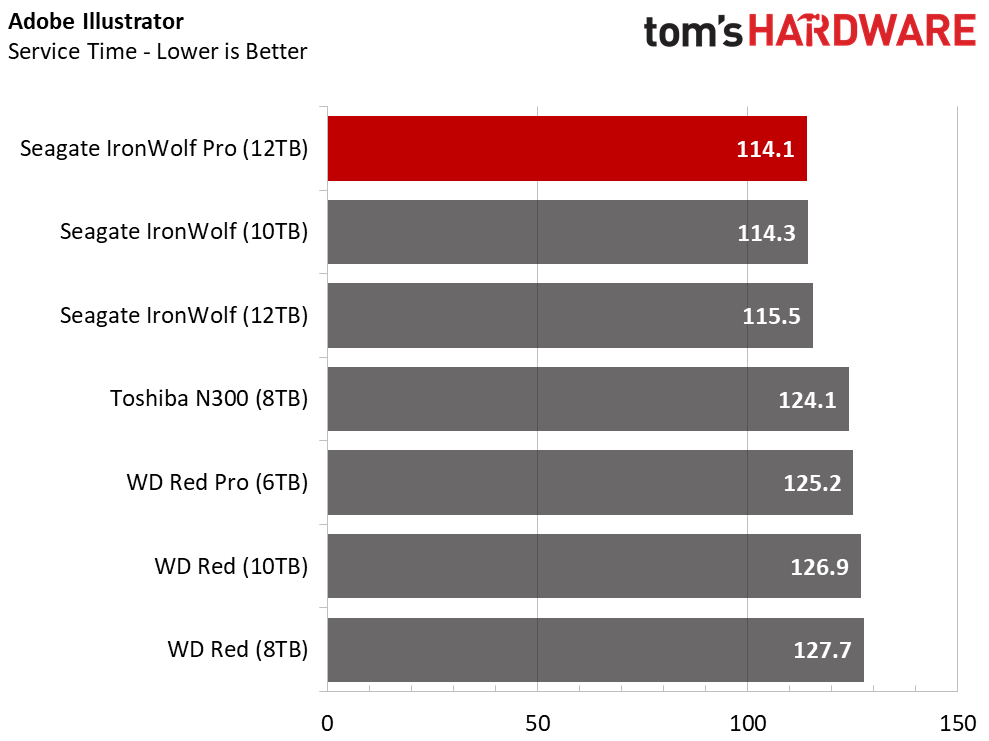
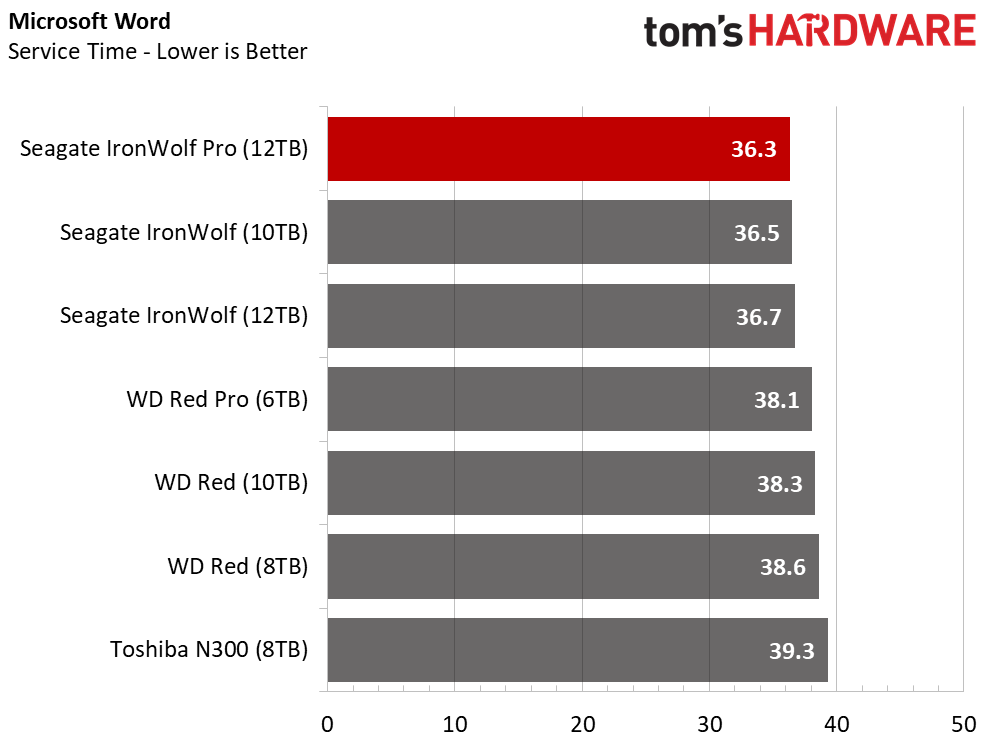
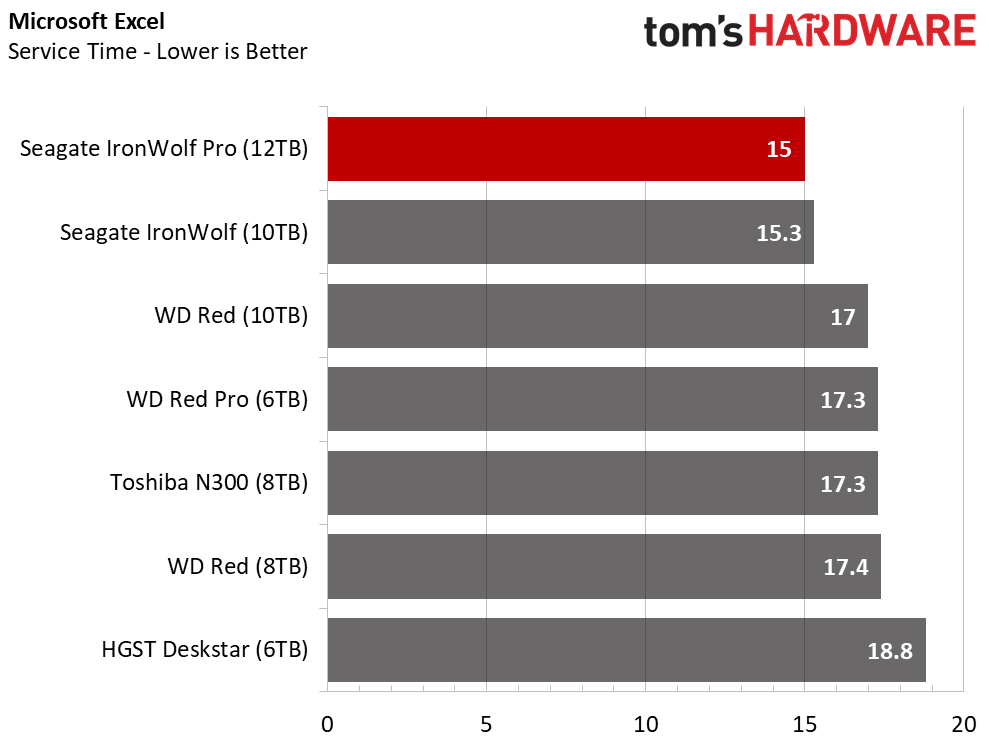
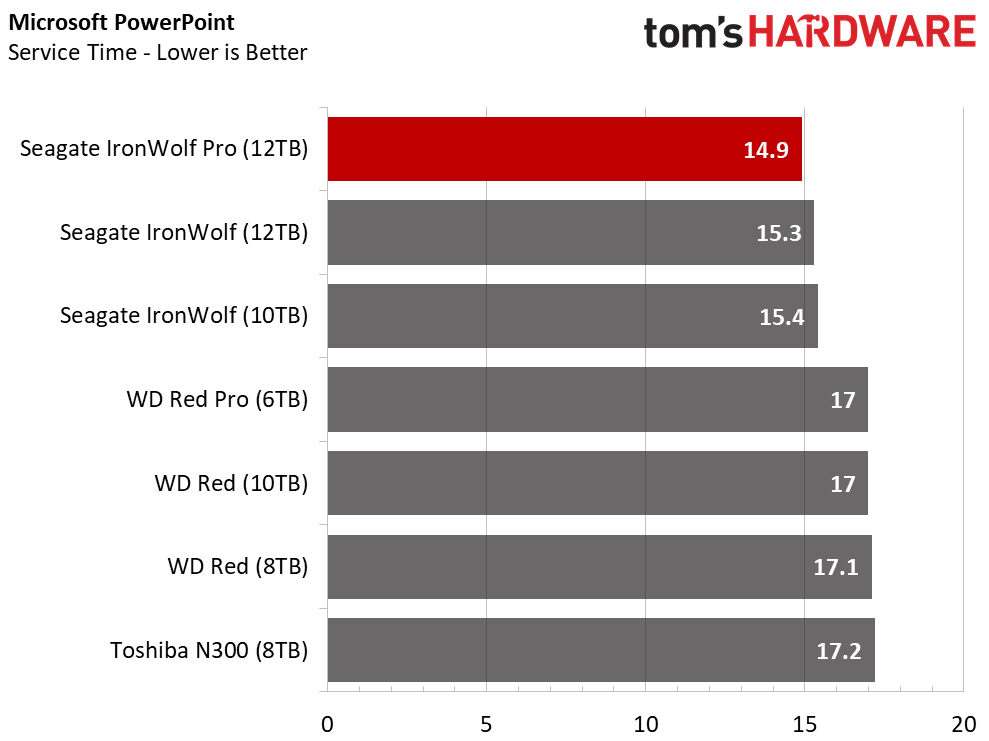
The 12TB IronWolf Pro really comes into its own during the service time tests and beats the other drives in nearly every test.
Application Storage Bandwidth
The Seagate IronWolf series dominates the application testing when the drives are attached directly to the system. Unlike SSDs, hard disk drives show more variation at the application level, so we measure differences in the tens of seconds in some tests.
MORE: Best SSDs
MORE: How We Test HDDs And SSDs
MORE: All SSD Content
Current page: Desktop Performance Testing
Prev Page Features & Specifications Next Page Network-Attached Performance Testing
Chris Ramseyer was a senior contributing editor for Tom's Hardware. He tested and reviewed consumer storage.
-
shrapnel_indie Hmmm... a takeaway from this seems like WD has intentionally made sure the HGST brand trails their own WD Reds in performance. Shame on them. (Of course, this might be model/capacity specific.)Reply -
svan71 Still waiting for hard drive prices to come down, or was there another earthquake or typhoon?Reply -
2Be_or_Not2Be Ignoring the warranty/data recovery service, does the Ironwolf Pro offer NAS-specific features that justify going with it over the regular Ironwolf models?Reply
I saw the blurb about RV sensors, but the non-Pro model has it as well. The only thing I can see that otherwise differentiates them is the workload rating (180TB/yr vs 300TB/yr). -
dextermat We need reliability test with huge hard drive. Considering the impact of losing important data. Also failing rate %.Reply -
achilles174 The impact is losing data is not unique to large drives and the solution is the same as it's always been - redundancy, whether it's RAID5/6 or ZFS. Yes, maybe you don't want to spend $1000 on two 12TB drives just for redundancy, but now you have a dollar amount to go with how important the data really is to you. In an 8 drive setup you'd still get 6x12 = 72TB.Reply -
Jesse_20 **EDIT:**Reply
Refreshing the page raised the $219 price tag on the 12TB to $469, a bit more expected. -
Co BIY I'd like to see an article with a 2 TB HDD paired with Intel Optane memory cache up against the SSD drives.Reply
With the proliferation of video especially security video I wouldn't be too surprised if HDDs set new sales records despite SSDs. -
JP76 Moved away from Seagate a few years ago after a bad experience with two of their drives on my NAS. I currently own 12 WD Red hard drives (2Tb and 3Tb) and had zero issues with them over the last few years. Other people might have a different experience, but I would take them over the Seagates anytime (even if they're 5,400-RPMs).Reply -
jasonelmore I don't mind paying $400 for a drive if it'll work for 5 years or more. Seagate's reputation has seen it's ups and downs. It was a good idea to invest in quality materials and engineering, and then back that reliability up with recovery services.Reply
